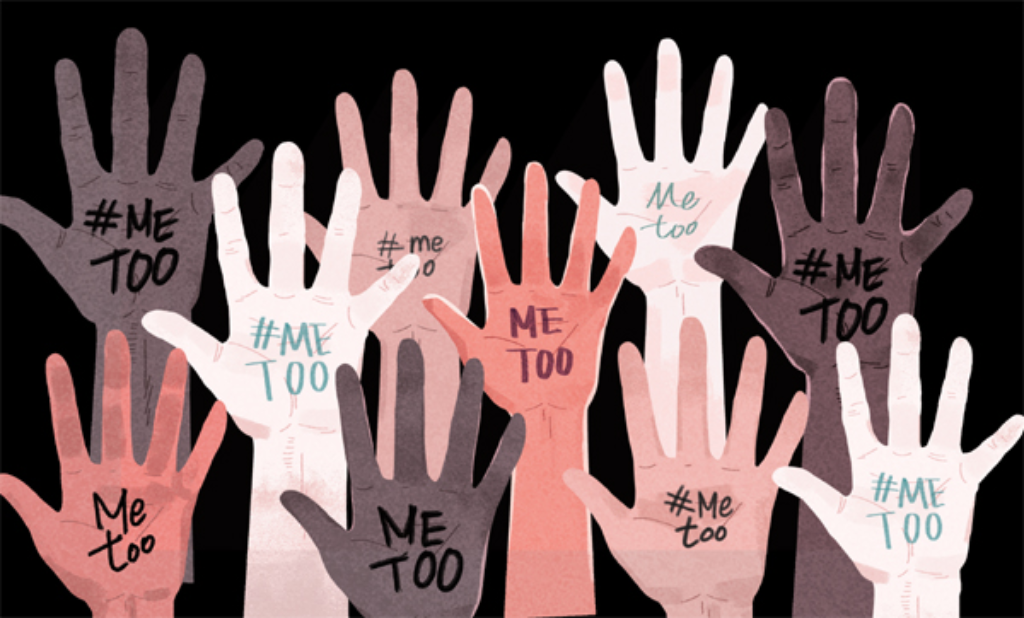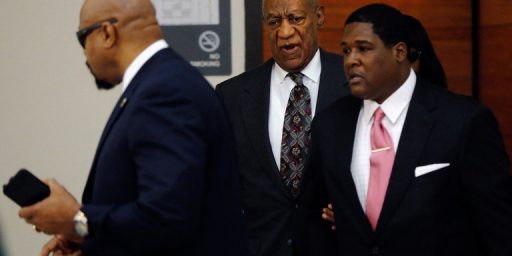Is There Room For Forgiveness And Redemption In The #MeToo Era?
Can society forgive the men caught up in the #MeToo movement? Is it even our place to decide?

In a column at Bloomberg, Tyler Cowen wonders if there’s room for second chances in the #MeToo era:
The longer that the #MeToo movement continues, the more important these questions will become: When should offenders be rehabilitated, allowed to resume their careers, and readmitted to polite society? Whether we like it or not, as the list of wrongdoers grows, questions of forgiveness will begin to outnumber questions of punishment. The thing is, questions of forgiveness are never entirely easy.
Much Christian doctrine, and especially Catholicism, emphasizes the value of confession, forgiveness and redemption. Thus it is not hard to convince many Americans that sinners should be given a second chance. This impulse occasionally finds its way into policy; just last month, a prison-reform bill became law, reflecting notions that criminals can indeed be rehabilitated. In her book “The Up Side of Down,” Washington Post columnist Megan McArdle stresses how many features of American life, including bankruptcy law and startup culture, depend on second, third or even more chances.
And indeed second chances are being doled out. Very recently, Louis C.K. has started doing standup comedy again. Conductor Charles Dutoit is back on the podium. \
The more delicate truth is that, in the context of the #MeToo movement, forgiveness carries great dangers. I am not referring to those asking for it; rather, I am talking about those in a position to offer it. The survivors of such abuse often feel shame, guilt and a loss of confidence and self-esteem. It is very costly, both psychologically and practically, for such individuals to step forward and levy charges. An emphasis on forgiveness could reinforce victims’ tendencies to bury the crimes and wrongdoings.
Even now, #MeToo victims are unlikely to do or say anything in response to their troubles. They are already looking for reasons to move on. They may forgive prematurely, before taking appropriate action, either at the personal or public level. Forgiveness cannot be complete if it does not come from those who have been wronged. Yet forgiveness is not entirely up to them, either.
The result is a set of conflicting and probably irreconcilable values. America believes in equal treatment before the law. But America’s increasingly powerful system of social pressures and sanctions does not provide for equal treatment.
(…)
there is still a place for forgiveness, a need to be humane and, sometimes, a case for rehabilitation, even (or especially?) for those who have helped to make the world a richer place (Picasso anyone?). Realistically, of course, these second chances will be applied selectively. This muddled mix may very well be the best that we can do.
On some level, of course, the question of forgiveness doesn’t belong to society as a whole, but to the individual women, and in some cases men, who have been victimized by those in a position of power or fame in the past. If they aren’t prepared to forgive, then it seems presumptuous and wrong for the rest of us to speak for the victim(s) or to “forgive” the perpetrators of sexual harassment or assault before the victim is prepared to do so. Even in cases where the victims have forgiven the perpetrators, though, Cowen is correct that there doesn’t seem to be any kind of a consistent guide or standard for when it’s okay to forgive the (mostly) men who have engaged in behavior that is now deemed to be socially unacceptable. As Cowen notes, there are some people such as Louis C.K. who seem to be bouncing back from the charges against them. Others seem unlikely to ever be forgiven.
Some of these cases are obviously different from others, of course. Men like Bill Cosby, Harvey Weinstein, and Kevin Spacey who have either been charged or convicted of serious sexual assault offenses should obviously be treated differently from men like Matt Lauer, Les Moonves, Al Franken and others, who have been accused of sexual harassment which, while clearly inappropriate, doesn’t rise to the level of criminal behavior. What are the standards for when they can or should be forgiven, and should they be given a second chance? Denying forgiveness altogether doesn’t seem to me to be the appropriate response. After all, the men in this second group did not commit crimes and, in many cases, the women who accused them of inappropriate behavior have received at least some form of compensation for the wrongs that were done to them. At what point does the social shunning come to an acceptable end, and who gets to decide what the standards are?
A final question deals with how we should handle the legacy many of these men left behind in the wake of their offense. In Bill Cosby’s case, for example, the numerous charges against him, both criminal and otherwise, caused him to lose pretty much all of the honors that had been bestowed on him and caused several cable networks to pull reruns of The Cosby Show and other Cosby material. So far, none of those shows have returned to the air notwithstanding the fact that, leaving aside the fact that the real Bill Cosby was a criminal, we’re talking about one of the best and most groundbreaking sitcoms of all time. Pulling the show also meant that all of the other actors on the show would be denied residual checks thanks to the behavior of one person in the cast. The same thing happened to the syndication of the 1990s version of Roseanne after the controversy that led to the end of the revival of the series thanks to social media comments on the part of Roseanne Barr. Recently, though, I noticed that the show had returned to its regular place in the rotation on TvLand. Does there come a point at which it will be okay for the same thing to happen to The Cosby Show?
I’m not sure I know the answer to these questions, but it does seem like we’re at the point where we should start asking them.





Forgiveness shouldn’t come before repentance. And repentance takes time and effort. It takes work and introspection. It leads to a desire to make atonement.
I haven’t seen any of the names you listed actually demonstrate that they have repented.
The separation, or inability to separate, art from creator is a more difficult issue.
@SKI:
Agreed. Far too many are quick to claim forgiveness before they’ve done anything other then get caught.
We must also remember forgiveness is gift, not a right one is due. You cannot force forgiveness just because it’s socially or politically expedient. It’s abusive in its own right to demand victims forgive their attackers just so it doesn’t cause social disruption; another way of exorcising power over them and telling them that their pain doesn’t matter but the comfort level of society does.
I believe in forgiveness but I also believe it’s incredible difficult, if not impossible for a leopard to change it spots. People don’t really change, not without a lot of time and effort to prevent backsliding. A lot of these offenders aren’t interested in even that much – they just want the quick wipe-the-slate-clean forgiveness without making the changes needed for it to be truly deserved.
In Apocalypse Now, Colonel Kilgore says, “Some day this war is gonna end.”
So too will the madness regarding the #metoo stuff.
@SKI:
Furthermore, in cases where there is a direct victims, as in sexual assault or harassment, it’s not really my place to forgive a wrong that was done to someone else.
@James Pearce: What exactly is “madness” of thinking that people shouldn’t assault, harass and demean other people?
@KM:
I wonder how much of that in this society is due to the influence of Christianity? As Cowen notes in Doug’s big quote “Much Christian doctrine, and especially Catholicism, emphasizes the value of confession, forgiveness and redemption.” While that is definitely an accurate statement of theology, coming from a different religious tradition, I can’t help noting that there is some things missing – resolution to not commit the same offense again, restitution to victims, contrition.
Oy…no wonder some people think you are a misogynist, with comments like that…
You are asking this question, but only of entertainers whose career depends, in large part, on people’s good will towards them. The answer in this case, may be never.
Louis CK will likely never regain a part of his audience. Sucks to be him. He might wrk to expand his audience to include those who think that masturbating in front of unwilling women is fine — and, indeed, based on the material he was trying it at a comedy club, that appears to be what he is doing.
Maybe if you depend on your reputation, you should take care of your reputation. Like a musician taking care of their hands.
@James Pearce: hmmm, a case of projection?
@SKI:
Never mind.
I didn’t realize that “sometimes #metoo went a little too far” was still being disputed.
@An Interested Party:
<–And this is the "madness" I was talking about.
@SKI: “I wonder how much of that in this society is due to the influence of Christianity? ”
More of a Faux Christianity, with cheap grace for the elites, and grudging, grinding, almost nonexistent grace for everybody else.
If you’ve been following the ‘debate’ in the media over this, it’s a bunch of people asking for (relatively) powerful offenders to be forgiven as soon as the news cycle had a single spin.
@grumpy realist:
Oh, definitely…
@Stormy Dragon: Exactly! It is not the province of society to offer forgiveness. Society’s province is to offer justice. The failure is that since that is society’s province, it also follows that whatever society offers must be justice even if it’s wrong and unjust.
@SKI: A significant part of the gap you’re noticing is because of the perception (at a minimum) that the message of Jesus is based on grace and Christians are (in theory at least) called on to be people of grace (to all, not just the one’s we want to offer grace to).
Of course, this feature is why Christianity may not be the best possible source for social and judicial policy for nations. It’s very centered on the individual, not the needs of society. I happen to believe that IF people lived their individual lives on the basis of Christian teachings, there would be fewer social problems. I can also clearly see that not even disciples of Christian teachings live their lives in this manner. It’s how I came to my first claim at the opening of the paragraph.
ETA: @Barry: Yes, Faux Christianity is a significant player and reinforces why Christianity may not be the best exemplar from which to form policy.
Forgiveness is just another time-sink of emotional labor. If men can’t handle not being forgiven or if they’re worried that #metoo is going too far, they’re not men. They’re just weird creepy libertarians and reactionary concern trolls. I mean, look at a picture of a Rod Dreher or a Tyler Cowen–Louis CK’s nasty humor worked not because he was nasty but because he was nasty to himself and how he looked and how this tied into sex and the women he wanted to sleep with.
The men who are uptight about #metoo and feminism are walking slugs, basically. They aren’t physically fit or attractive and they aren’t clever or interesting to women. They’re just kind of there, just asking questions.
@SKI: I came here to say what you said in the first comment, that forgiveness should be preceded by repentance, by contrition, by making amends.
And yes, this is part of the Christian tradition too. Jesus was preceded by John the Baptist, who preached repentance and baptism – which was a figurative form of rebirth, and a turning away from old ways (of which you had repented). It’s part of the 12 step program, while not specifically Christian, has deep roots in Christian traditions. Step one is “Let go and let God”.
And it’s exactly public repentance that’s the hard part. Because what will happen with a public repentance is that first people will escalate their complaints, not mitigate them. This is testing of a sort. “Do you really get what was wrong with what happened?” “Is this sincere?”
Then people move on to forgiveness. Usually.
Repentance is usually accompanied by some empathetic acknowledgement of how you made things bad for other people.
So, let’s recap, shall we? Someone compares the #Me Too movement to madness and then it is also madness to point out that the person who doesn’t take #Me Too seriously might have a problem with females…uh huh…maybe #Me Too just makes that person mad…
As I look at it, we’re discussing two levels of forgiveness, from the individual women who were harassed or assaulted and a second, broader question as to whether men who behaved as cads, can be accepted back into society and allowed to resume their careers and social lives after acknowledging their guilt.
I’ve come to the conclusion that there is not a male on the planet, past puberty, who has not sexually harassed or contributed to the harassment of a woman/women and most likely many times. If there is no societal forgiveness for transgressions then the extreme is ostracized men and angry women.
@Sleeping Dog: It’s one thing to forgive someone who says “you know, what I did was really crappy and abusive and I apologize and will never do anything like that again.” It’s another thing to forgive someone who says: “hey, you broads are too uptight! What guy hasn’t copped a feel at some point? I didn’t do nothing wrong!”
(Of course, if you want us to be forced to actively defend ourselves, I’m sure there will be some stiletto manufacturer who will be willing to oblige, as well as the NRA. Still interested?)
@Sleeping Dog:
…and you just glossed totally over the whole “repentance and reparations” portion of the discussion. Do you genuinely not see the difference between
1. people who have done bad things, recognize that they were bad, and are now trying to both do better and make amends, and
2. people who are annoyed and angry at having been caught, and really angry at having been publicly shamed, and are now trying to counter-shame their accusers and minimize their offenses and weasel their way back into privilege?
I’m not going to tell any individual whom they should or should not forgive; that’s a personal decision. For society, though, genuine contrition is a prerequisite.
Oh, like Kevin Hart…such a shame about the whole Oscars thing…
Les moonves may or may not have committed crimes. But if he wanted to sleep with you, and you didn’t oblige, there’s a decent chance he’d destroy your career.
@Teve: But remember, the #Me Too movement is “madness”…
My response to #MeToo has been, ‘finally!’ I’ve been waiting all my political life for women to push back. Frankly they’ve been as frustrating as the oft-anticipated and too often absent ‘youth vote’. They’ve punched far below their weight politically and in society at large. And they are not a minority. Women are the majority of voters, they’re the majority in virtually every single political district at every level of government. The instant they decide to start acting with the kind of unity African-Americans and Jews do politically, it’s going to be game over for the ‘patriarchy.’
Am I on ‘their’ side? Yes, I am. I never liked the assholes we men too often allowed to define us. The fact is we failed. We failed to stop the Weinsteins and the Cosbys, in fact an awful lot of us laughed at that kind of thing and the rest of us – and yes, I do mean us – stood around looking uncomfortable at best. This is women filling a moral vacuum we created and tolerated.
Is it going to sometimes go too far in individual cases? Sure. Sadly. But if you don’t want to be bombed, don’t start the war. And to be clear: we started it. We’re the predators. What decent men need to do is stop pretending to feel for the sons of bitches we’ve never liked anyway and apologize that we didn’t handle these creeps ourselves.
30 years ago I recall distinctly telling my wife we were rushing into a crisis of masculinity in this country. That’s where we are now. Men who’ve been trained to believe they were soldiers and warriors and hunter-gatherers, grunt grunt, need to take a look around and realize that no, they aren’t, they’re some dude who bends pipes or pushes paper. Grow all the beards you like, pump all the iron, this is civilization circa 2019, adjust.
@An Interested Party:
This is what I’m talking about. I didn’t harass or assault anyone. I said something critical about your toxic politics and to rebut me, you rolled up with barrels of leaking goo.
@James Pearce:
That isn’t what you claimed.
You said:
You called it a “war” and “madness”. That isn’t expressing concern that there may be excesses. that is attacking the very movement itself – a movement that points out how prevalent assaulting and harassing women is.
So, I ask you: what is your actual problem with the #metoo movement? Because it sure seems like you just don’t like that women are now saying they shouldn’t be harassed and assaulted. If we are wrong, explain exactly what you have a problem with.
@An Interested Party: How about men who are victims of abuse? Who helps them?
@Tyrell: Holy non sequitur, Batman!
What are you trying to say? That because a very small group of men also get abused, we can’t have a discussion over the reality that an overwhelming majority of women experience abuse and harassment? Really?
@SKI:
For one, I’m really uncomfortable with social media digital mobs relying on rumor and hearsay or even some published accusation to destroy people. I believe in due process, not to benefit the guilty but to benefit the falsely accused.
I also have a very low tolerance for progressive obnoxiousness anymore and I really think you should wait to hear something misogynist before you call someone a misogynist, but I grant that is difficult for some people to resist.
@Tyrell:
Not these performative lefties…that’s for damn sure.
@James Pearce:
Except that isn’t what the #metoo movement is about.
You are describing a phenomenon of modern social media that is completely separate and apart from #metoo in that is existed before and in completely different areas.
With specific respect to #metoo, do you deny that the experience of the vast majority of women having been abused and/or harassed is (1) real and (2) problematic?
____
I’ll also note the irony, which apparently flies completely over your head, of you decrying the “progressives” as people using stereotypes to render judgment when that is *precisely* what you are doing yourself…
@James Pearce:
Yes, that’s why Kevin Spacey is so much in demand for so many network and streaming shows, right? Or why George Takei is still lauded all over the internet.
Why don’t you just take your goalpost and go home.
@SKI:
Yeah, okay…
What kind of question is this? Seriously.
This is not a debate between people who accept the reality of sexual abuse and the people who deny it. Sheesh…
@Kathy:
You bring up George Takei like it rebuts my point????
@James Pearce:
Actually, that *is* the debate the rest of us keep dealing with. Perhaps not deny totally but minimize, denigrate and concern troll about that stark reality.
“Wah, you are being unfair to the poor men.”
“I’m scared about false accusations.”
“I’m sure it happens but I don’t see it”
“Isn’t there any forgiveness?”
“Its just harmless flirting.”
“You are so sensitive.”
Your comments definitely sound like a guy whop denies the seriousness of it. I’ve only seen you post complaining about how excessive it is or the impact on men. Have you ever posted about its validity or the impact on women? Once?
@James Pearce: You’re certainly writing like some dude who has sexually harassed women in the past and now is desperately scrambling to find a justification for it.
If you don’t want to do the time, don’t do the crime.
@SKI:
The debate is “do we go go completely nuts on these topics” (the #metoo position) versus “do we handle these issues in a more measured way?”
@grumpy realist:
You can tell that by my writing, huh?
@James Pearce:
Yes, she can, and so can I. Of course, unlike you, we lack psychic powers allowing us to glean the political opinions of people on light rail.
Oh, and BTW, you were 100% wrong about the shutdown.
@James Pearce:
No, that is the debate you want to have. The same way racists want to have a discussion about wanting to live in a “color-blind society” because they don’t want to acknowledge systemic racism and the legacy we still live in.
Your framing presumes that honestly grappling with misogyny and its impact on the women in our society is “nuts”. That presumption is very telling about who you are and how you think.
As usual in discussions of this sort, it is framed from the viewpoint of the offenders. Let’s turn that around.
When will the people who were sexually used and had their careers damaged be given restitution? What would that restitution look like?
@James Pearce:
OK. Here’s a serious, non-rhetorical question:
How many guilty abusers are you willing to have continuing to get away with it, to prevent one additional false accusation?
That’s really the core question here. As with every other aspect of justice, we can’t have certainty; we can only have a balance between Type 1 and Type 2 errors — failing to stop the guilty, and punishing the innocent.
I happen to agree with you that punishing the innocent is worse than failing to punish the guilty. Allowing the guilty to continue with impunity is worse than either (IMHO), but you might disagree. But when we’re talking about literally tens of millions of abused and harassed and damaged women, how many false accusations are enough to cause you to abort the entire effort at justice. (And that is exactly what you are arguing for — if you think #metoo is too extreme, there is no effective effort that you would support.)
One? A hundred? A thousand? What’s your standard here?
Umm, no…you accused a legitimate movement for women who are mistreated by men of being “madness”, so of course that leaves you open to being judged as someone who has a dim view of women…
@Michael Reynolds:
For the hundredth time, my light rail people are an exercise in empathy, Michael. And public transit. One is something you don’t have and the other is something you don’t care about. You can figure out which is which.
@SKI:
I do not believe that #metoo is “grappling with misogyny” –the Bryan Singer and Kevin Spacey cases have nothing to do with misogyny at all— so much as it is about exposing long-hidden sexual predation by people in power against people who have less power. And time after time I’ve seen it devolve into “left v right” or “men v women” and nothing is being done about those off-kilter power dynamics. Or I should say, nothing is being done by folks who think it’s about left v right or men v women.
@Cheryl Rofer:
Bill O’Reilly, Donald Trump, Harvey Weinstein, Bill Cosby, and so many others have a history of paying restitution to the women they abused. Buying silence is literally how they were able to get away with it for decades.
@DrDaveT:
I don’t know but it seems to me that if we want to make it easier for credible allegations to be heard, we’re going to also need to be careful about weeding out the false or exaggerated allegations.
@An Interested Party:
That’s just sloppy thinking.
In other words, you haven’t thought it through. I guessed that. So now that you’ve had a chance to think it through, where do you come out? A rough order of magnitude will do.
It seems to everyone else on the planet that #metoo has done more to “make it easier for credible allegations to be heard” than every other past action or movement in history, combined. If that’s not good enough for you, then clearly you are concern trolling and not genuinely interested in having credible allegations get a serious hearing.
Or maybe it’s a matter of your sloppy writing…in the future, try not to tar a whole group if you think that some of what they do is actually a good thing…
@DrDaveT:
Don’t assume that, Dave. I tend towards the Thomas More view from A Man For All Seasons, but I’m not sure really how much I agree with it.
It’s a social media hash tag, though. There haven’t been any legal reforms. A lot of dudes have gotten fired, but as far as I know, Bill Cosby is the only scoundrel who’s seen the inside of a courtroom. Instead, these issues are being decided in corporate boardrooms and that strikes me as incredibly inappropriate.
How is that justice?
@An Interested Party:
Okay, I’ll continue to write with my usual nuance, which will be no doubt continue to be lost on the bulk of my interlocutors.